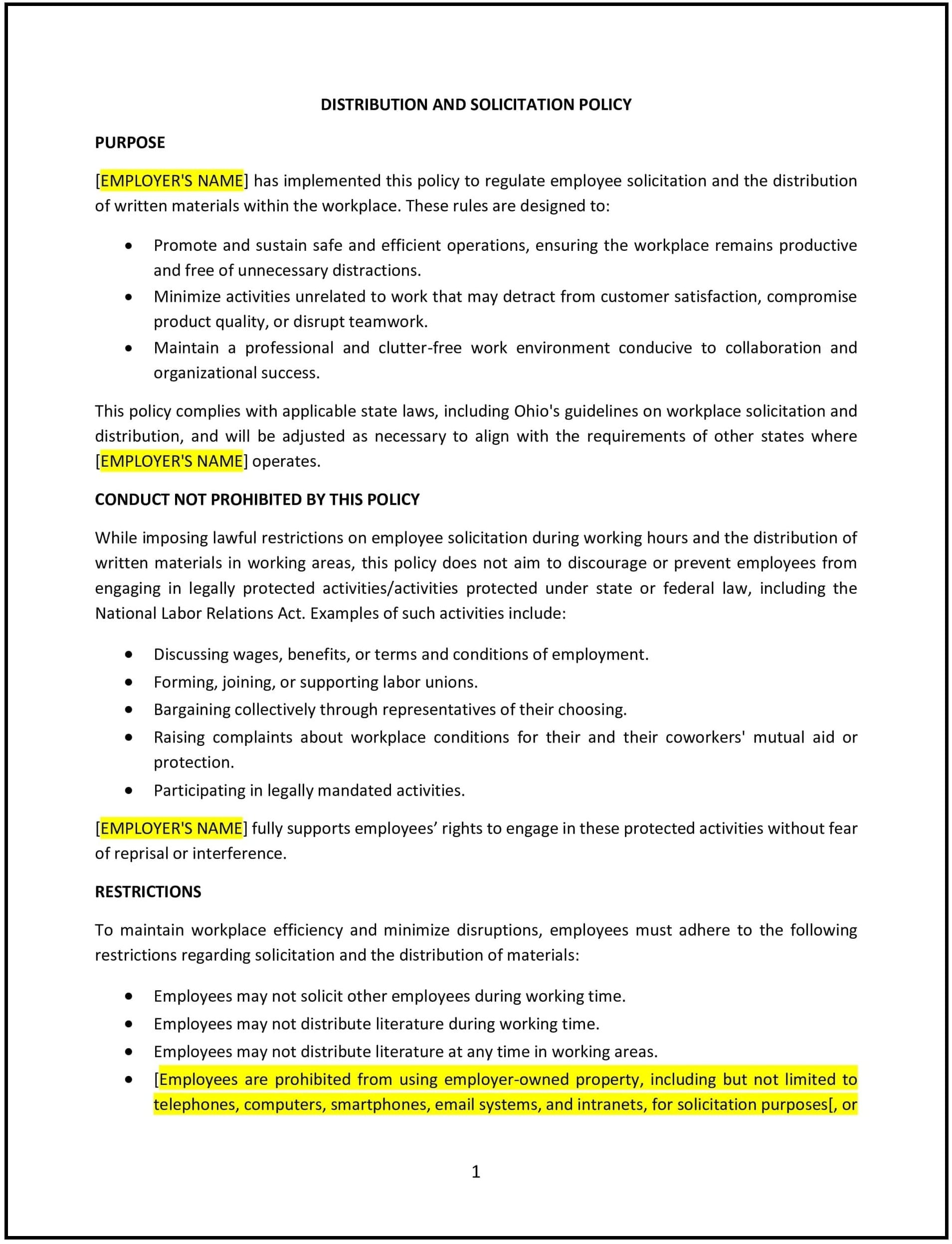Distribution and solicitation policy (Ohio): Free template
Got contracts to review? While you're here for policies, let Cobrief make contract review effortless—start your free review now.

Customize this template for free
Distribution and solicitation policy (Ohio)
A distribution and solicitation policy establishes the guidelines for Ohio businesses regarding the distribution of materials and the solicitation of goods, services, or donations on business premises. The policy aims to balance the need for business operations with the rights of individuals or organizations wishing to distribute information or solicit contributions. It sets clear rules for when and where solicitations can occur, what types of materials are permissible, and the process for obtaining approval for solicitation activities. This policy helps maintain a productive and safe work environment while ensuring compliance with Ohio state laws.
By implementing this policy, Ohio businesses can maintain order on their premises, protect employees from unwanted solicitation, and ensure that any solicitation activities are aligned with business goals and values.
How to use this distribution and solicitation policy (Ohio)
- Define permissible solicitation activities: The policy should outline the types of solicitation activities that are allowed, such as the distribution of informational flyers, charitable fundraising, or employee advocacy efforts. It should specify any restrictions based on the nature of the solicitation.
- Establish designated solicitation areas: Specify where solicitation activities can take place, such as in designated areas of the workplace, or during specific hours. The policy should limit solicitation to areas where it will not disrupt business operations or employee productivity.
- Set guidelines for approval: The policy should establish a process for obtaining approval for solicitation activities. This may include submitting a formal request, providing details about the solicitation, and specifying the time and location for distribution.
- Address third-party solicitations: The policy should specify whether third parties, such as external vendors or charitable organizations, are allowed to solicit or distribute materials on business premises. If allowed, it should set guidelines for approval and the types of materials that can be distributed.
- Prohibit disruptive solicitation: The policy should prohibit solicitation activities that disrupt work, harass employees, or interfere with the business environment. This includes limiting solicitation during work hours or in workspaces where it might cause disruption.
- Ensure compliance with Ohio state laws: The policy should ensure that solicitation activities comply with Ohio state laws, including any restrictions related to public spaces, business premises, and employee rights.
- Monitor and enforce the policy: The policy should establish a system for monitoring solicitation activities to ensure that all rules and procedures are followed. It should also specify the consequences of non-compliance with the policy.
- Review and update regularly: The policy should be reviewed periodically to ensure it remains in line with Ohio state laws, business needs, and best practices for managing solicitation activities.
Benefits of using this distribution and solicitation policy (Ohio)
This policy provides several key benefits for Ohio businesses:
- Promotes a productive work environment: By setting clear guidelines for solicitation, the policy helps minimize distractions, allowing employees to focus on their work without unnecessary interruptions.
- Reduces legal risks: The policy helps the business comply with Ohio state laws regarding solicitation on private property, reducing the risk of legal challenges or complaints.
- Protects employee rights: By specifying when and where solicitation can occur, the policy ensures that employees’ rights to a distraction-free workplace are protected, while also balancing the right to solicit for causes.
- Enhances control over business premises: The policy allows businesses to maintain control over what is distributed and who is allowed to solicit on their premises, ensuring that only appropriate materials and individuals are present.
- Supports corporate social responsibility: By providing a structured process for charitable donations or advocacy efforts, businesses can support causes aligned with their values while managing the impact of solicitation on the workplace.
- Improves workplace culture: Clear guidelines on solicitation can foster a respectful and collaborative work environment by establishing boundaries around what is appropriate and ensuring fairness for all employees.
- Reduces disruptions: By regulating solicitation activities, the policy helps prevent disruptions that could interfere with employee productivity or business operations.
Tips for using this distribution and solicitation policy (Ohio)
- Communicate the policy clearly: Ensure all employees are aware of the policy by including it in the employee handbook and discussing it during onboarding. Provide periodic reminders, especially when any updates are made.
- Set up a straightforward approval process: Make the approval process for solicitation activities simple and transparent, ensuring that all requests are processed efficiently and fairly.
- Monitor solicitation activities: Designate an employee or team to monitor solicitation activities to ensure compliance with the policy and address any concerns or complaints promptly.
- Be mindful of work areas: Ensure that solicitation activities are limited to designated areas of the business to avoid disruptions in workspaces or areas where employees need to remain focused.
- Consider employee feedback: Occasionally review the policy to ensure that employees are comfortable with the guidelines for solicitation. Solicit their input on any issues or concerns they may have.
- Review and update regularly: Periodically review and update the policy to ensure it reflects current Ohio state laws, evolving business practices, and any changes in company values or objectives.